 Randy and Jane Miller of Miller Bison in Bruner, Mo., have had a longtime love of the once prominent symbol of the American West. Growing up in the Kansas cattle business, Randy had some exposure to bison and was interested in the huge, majestic animals. In 1995 the Millers purchased their first bison – 20 head of heifers from the annual Custer State Park Buffalo Sale in South Dakota. And so a learning journey began. “The more we had them, the more they grew on us,” Randy said. At the time Randy and Jane entered the bison industry, there was a limited amount of information available to bison breeders – so nearly everything was an experiment. The Millers stuck with the ups and downs of the market and eventually found a niche selling bison meat to chefs in Colorado. “We brought a quality and consistent product,” said Randy. Consistency proved to be the key in the bison meat business and today, Miller Bison sells an estimate of 1,000 head of processed bison annually.
Randy and Jane Miller of Miller Bison in Bruner, Mo., have had a longtime love of the once prominent symbol of the American West. Growing up in the Kansas cattle business, Randy had some exposure to bison and was interested in the huge, majestic animals. In 1995 the Millers purchased their first bison – 20 head of heifers from the annual Custer State Park Buffalo Sale in South Dakota. And so a learning journey began. “The more we had them, the more they grew on us,” Randy said. At the time Randy and Jane entered the bison industry, there was a limited amount of information available to bison breeders – so nearly everything was an experiment. The Millers stuck with the ups and downs of the market and eventually found a niche selling bison meat to chefs in Colorado. “We brought a quality and consistent product,” said Randy. Consistency proved to be the key in the bison meat business and today, Miller Bison sells an estimate of 1,000 head of processed bison annually.
While the Millers have deep roots in the bison industry, they are relatively new to the Missouri area. They have owned Elkhead Ranch in Bruner for a year and a half – the first and original half of their business is in Nebraska. They purchased their second ranch in southwest Missouri with the intent of running their cows and calves on fescue and experimenting with the results. The results surpassed their expectations in a positive way and now, the Miller’s main purpose for their stocker/feeder program on the Missouri ranch is to house weaned bison calves brought from their Nebraska bison facility, pasture them up to 750-800 pounds, and then send them back to Nebraska to finish on a feedlot before being shipped to Colorado for processing.
Randy and Jane like to keep the environment low stress for their bison and to treat them with a more “hands off” approach. This contributes to a happier, healthier animal. The chutes used for working the bison are based off of Temple Grandin’s designs, with rounded alleys, covered sides and a catwalk around the outer perimeter. This kind of set-up works extremely well for bison; “At the last sort, we worked 300 in seven hours,” said ranch manager Andy Thies. None of the bison receive any sort of antibiotic, and vaccinations are minimal – Randy likes to use common vaccines like seven-way and blackleg, plus a multi vitamin injection. Parasites, however, are a little harder to handle – “Parasites are the biggest hindrance in bison,” Jane said. To combat this, the Millers turned to a three times annually deworming program. Bison also need heavy amounts of copper and selenium, so the Millers make sure to provide those elements in high amounts. All of the breeding at Miller Bison is natural cover – bison cows generally take well, and pulling calves with bison is unheard of. The calves have a low birth weight of about 50 pounds, and are usually born starting in May. Randy likes to keep a “diverse herd of genetics” when it comes to breeding. He has integrated Woods bison from Canada in with Plains bison, producing crosses that finish “quicker, faster and bigger.”
Turning out finished bison is not the only avenue for Miller Bison at Elkhead Ranch. Randy and Jane have also introduced some unique agritourism opportunities on their Bruner spread. On a limited basis, Elkhead Ranch offers bison hunts, deer hunts and fully furnished rental cabin. Horseback riding trails, ATV trails, a fully stocked lake for fishermen and the chance to help work the bison are some other available amenities for ranch guests.







